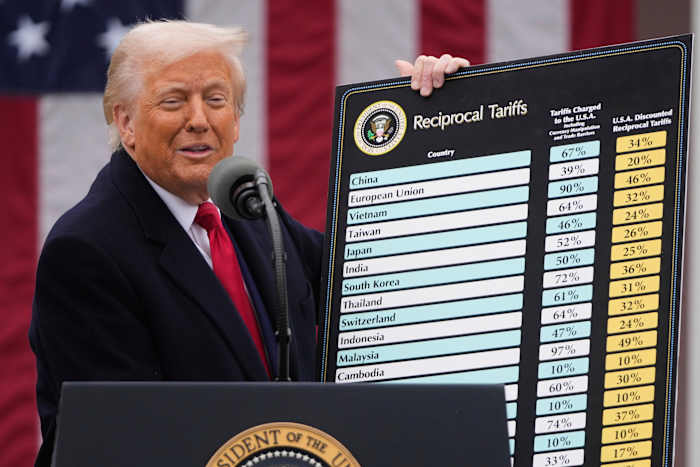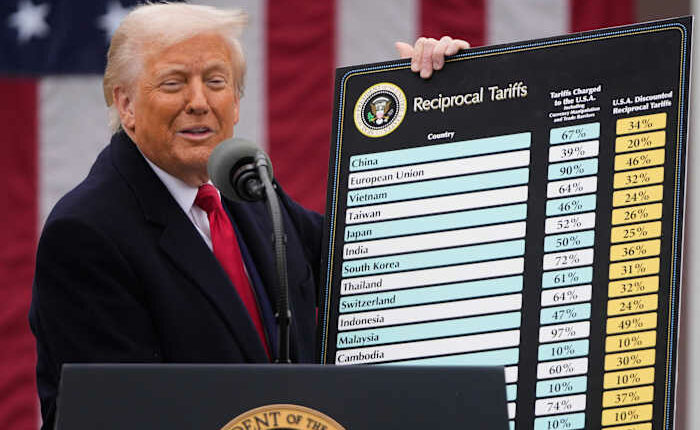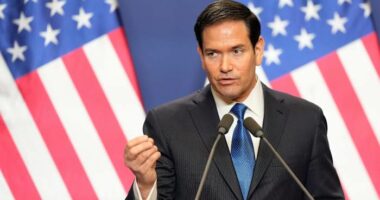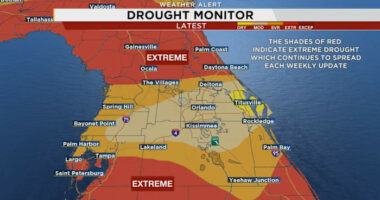Share this @internewscast.com

WASHINGTON – President Donald Trump often highlights the surge of funds flowing into the U.S. Treasury from the significant tariffs he has imposed on imports from nearly every nation worldwide this year.
“We have trillions of dollars coming into our country,” Trump mentioned on Wednesday. “Without tariffs, we would be a nation with limited wealth, vulnerable to exploitation by all other countries, whether allies or adversaries.”
However, two courts have deemed his largest and most ambitious import taxes as unlawful. If the Supreme Court confirms these rulings and invalidates the taxes permanently, the federal government may need to reimburse many of the collected taxes from businesses that import goods into the U.S.
“This could involve issuing hundreds of billions in refunds, impacting numerous importers,” stated trade attorney Luis Arandia, a partner at the law firm of Barnes & Thornburg. “Reversing this will be the most significant administrative endeavor in U.S. history.”
Everyday Americans, who have faced higher prices on some items due to the tariffs, are unlikely to benefit directly from the refunds. The repayments would be returned to the companies that initially paid the tariffs.
These refunds would also disrupt a key source of tariff revenue that the president has relied on to help fund the large tax cut bill he approved on July 4, posing a threat he claims could “literally destroy the United States of America.”
At issue are revenues raised from tariffs Trump imposed this year by invoking the 1977 International Emergency Economic Powers Act (IEEPA). One set of IEEPA tariffs targeted almost every country on earth after he declared that the United States’ massive and persistent trade deficits amounted to a national emergency. Another was aimed at Canada, China and Mexico and was meant to counter the illegal flow of drugs and immigrants across U.S. borders.
But a specialized federal trade court in New York ruled in May that the president overstepped his authority by ignoring Congress and imposing the IEEPA tariffs. The U.S. Court of Appeals for the Federal Circuit last week largely upheld the trade court’s decision, though it also ordered the lower court to re-consider whether there was any legal fix short of striking down the tariffs completely.
The appellate judges also paused their own ruling until mid-October to give the administration time to appeal to the Supreme Court – something that it did on Wednesday. Solicitor General D. John Sauer asked the justices to take up the case and hear arguments in early November.
If the high court strikes down the IEEPA tariffs, importers could be entitled to refunds. The U.S. Customs and Border Protection agency reports that it had collected more than $72 billion in IEEPA tariffs through Aug. 24.
For importers, Ted Murphy, co-leader of the international trade practice at the Sidley Austin law firm, said: “It’s a question of what you’re going to have to do to get the refund.
“And the options are everything from nothing — the government may just automatically refund it; I don’t think this is likely, but that’s one option. There could be an administrative process, so you have to go to U.S. Customs and Border Protection and apply for a refund of your IEEPA tariffs. Or you could have to file your own court case.’’
There’s a precedent for courts setting up a system to give companies their money back in trade cases. In the 1990s, the courts struck down as unconstitutional a harbor maintenance fee on exports and set up a system for exporters to apply to get their money back.
“Companies got refunds,’’ Murphy said. One hitch: In that case, the government did not have to pay interest on the tax it collected and had to pay back. It’s unclear whether the government would have to pay interest on any IEEPA tariff refunds.
The Trump administration might balk at paying back the tariffs it’s collected. Trump has already said he doesn’t want to pay the money back, posting on his social media site in August that doing so “would be 1929 all over again, a GREAT DEPRESSION!”
“I would anticipate that if the administration did lose, they would turn around and start arguing why it would be impossible to give refunds to everybody,” said Brent Skorup, legal fellow at the libertarian Cato Institute. “I think there will a lot of litigation about the nature of refunds and who’s entitled one. And I expect the administration will raise all sorts of objections.”
To make sure they can successfully claim refunds, said Barnes & Thornberg partner Clinton Yu, “importers really need to have their records in order.’’
Adding to the uncertainty is the chaotic way that Trump has rolled out his tariffs — announcing and then delaying or altering them, sometimes conjuring up new ones. Occasionally, the administration has decided that importers that have already paid one of his tariffs don’t have to pay a different one.
Tariff are paid by importers, who often then try to pass the cost on to their customers through higher prices. But consumers would not have recourse to ask for refunds for the higher prices they had to pay.
“It’s the importer of record that is legally liable for paying tariffs and duties,’’ Arandia said. “They would be the only one to have standing to even get that money back.’’
____
AP Writers Lindsay Whitehurst and Josh Boak contributed to this story.
Copyright 2025 The Associated Press. All rights reserved. This material may not be published, broadcast, rewritten or redistributed without permission.










